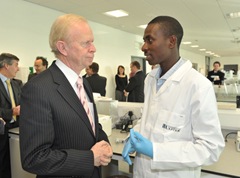Skills, knowledge and success
 Employment and Learning Minister Sir Reg Empey explains why he thinks Northern Ireland’s new skills strategy will improve our economic performance, especially by up-skilling those already in work.
Employment and Learning Minister Sir Reg Empey explains why he thinks Northern Ireland’s new skills strategy will improve our economic performance, especially by up-skilling those already in work.
The economy is rightly at the heart of the Northern Ireland Executive’s current Programme for Government, but to achieve the innovative, dynamic economy the Executive aspires to, it must continue to refine its policy toolkit.
The Independent Review of Economic Policy led by Professor Richard Barnett, Vice-Chancellor of the University of Ulster, recognises the important correlation between raising the skills profile of the workforce, increased productivity and competitiveness. It also acknowledges the excellent work that has already been taken forward by my department in the last number of years. However, as always, more can be done.
The ambition of the Executive is to grow a dynamic and innovative economy that will provide the wealth and resources to build a peaceful, prosperous and fair society. The vision for skills therefore must be able to support this aspiration by ensuring that excellent leadership is provided from well-qualified managers supported by highly skilled workforces.
While the skills agenda continues to be a priority for Northern Ireland, much of the context, both politically and economically, has changed. The current economic downturn contrasts sharply with the period of extensive growth that we had experienced and the full effects continue to be felt. Politically, direct rule gave way to devolution when the institutions were restored in May 2007.
My department is looking to achieve this by focusing on those entering the labour force for the first time, up-skilling the existing workforce and ensuring those currently excluded from the workforce are provided with the skills to compete for jobs, retain jobs and progress up the skills ladder.
I have recently launched the revised and updated skills strategy for Northern Ireland – Success through Skills 2 – for public consultation. This report reviews progress to date, looks at our current skills base and examines the skills we will need in the future to grow the Northern Ireland economy. Areas highlighted for action include:
• the importance of up-skilling the current workforce;
• the need for higher level skills;
• the need to increase skills in certain subject areas to reduce sectoral imbalances;
• a need for increased management and leadership skills; and
• the need to attract skilled people to Northern Ireland.
Further education colleges, universities and the workplace are all important centres for skills development in Northern Ireland which is why my department invests heavily in higher education, further education and in professional and technical training. The skills delivery infrastructure has become increasingly flexible and better at meeting the needs of individuals and employers thanks to this investment.
A close working relationship between key departments within the Executive is vital if Northern Ireland is to provide a good environment for both local companies, and those companies investing in Northern Ireland from abroad, to thrive in. Key partners are the Department of Education, the Department of Enterprise, Trade and Investment and Invest Northern Ireland, and my department.
An example of the tangible benefits resulting from excellent working relationships is the recently launched Assured Skills pilot programme which sees my department and Invest Northern Ireland working together on training projects on behalf of new inward investors, or existing companies who wish to increase the scale of their operations in Northern Ireland.
Northern Ireland has to be able to assure companies that it has the well-trained workforce that they will require to make a success of their investment. We have a wide range of training programmes that a company can make use of – the key factor will be demonstrating our ability to deliver a tailored package specific to each company’s needs.
The project is modelled on the workforce training model in the US state of North Carolina and in particular its New and Expanding Industry programme. This programme allows the state government and community college system (similar to our network of further education colleges) to meet the precise training needs of companies creating new jobs and is an effective way of promoting the state as a destination of choice for expansion.
Northern Ireland has a proud history of enterprise and innovation. My department is committed to ensuring that we continue to be a good place to do business.





